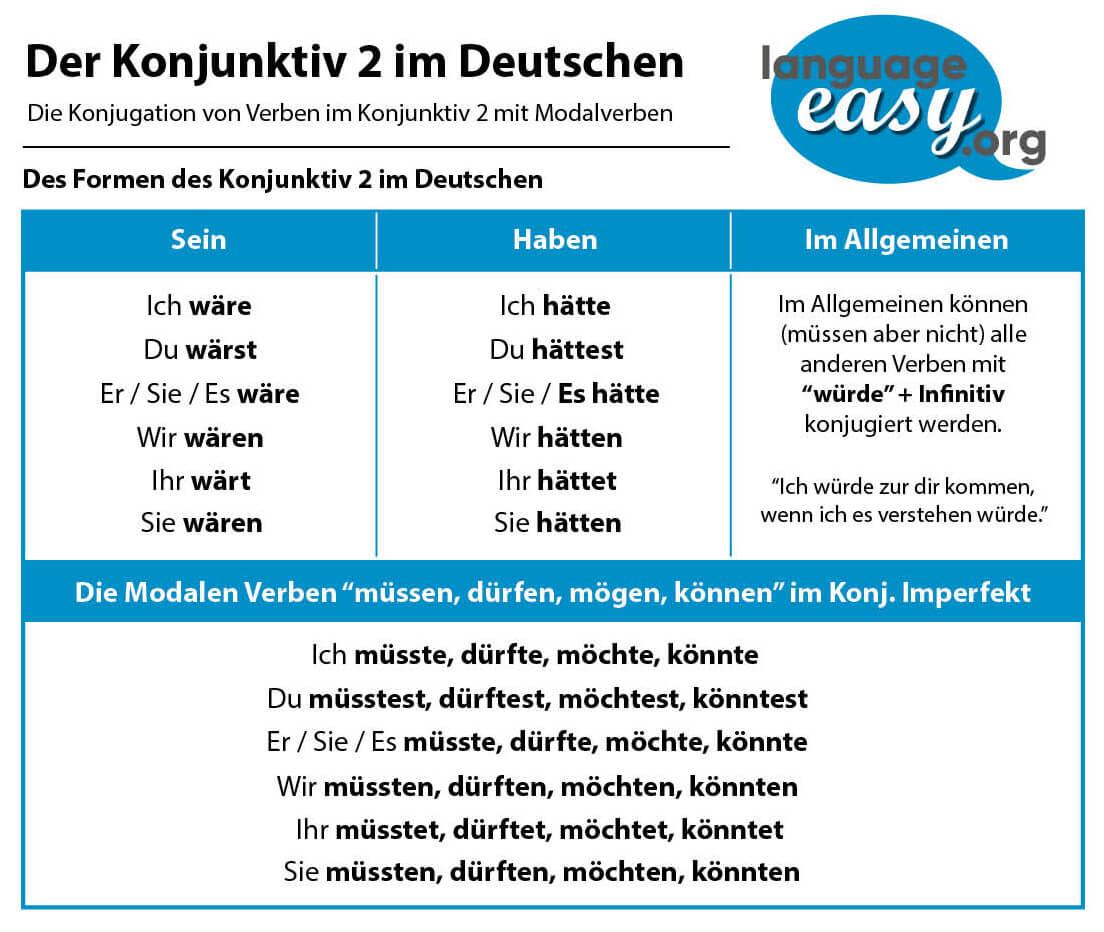The German Subjunctive 2
Der Deutsche Konjunktiv 2
The German Subjunctive 2 – Summary
Zusammenfassung
You use the subjunctive 2 form when you talk about something which will most likely not happen. You also use this mode in indirect speech and in very polite questions or statements. So, have a look at the following list:
- (Unreal) wishes and hopes
“Philip wünschte, er hätte einen Hund.” - (Unreal) statements and conditional clauses
“Wenn Philip einen neuen Computer hätte, säße er den ganzen Tag am Schreibtisch.” - Indirect speech, in case the conjunctive 1 form can not be used
“Philip sagt, ich müsse noch viel Mathematik lernen.” - Very polite and careful requests or statements
“Wärst du so lieb, mir die Butter zu reichen?”
Forming the Subjunctive 2
There are two forms of the subjunctive 2, depending on the situation taking place in the present or in the past.
- Situations in the present
For subjunctive 2 forms in the present, you just add the subjunctive endings to the stem of verb in the past tense. Strong verbs with “a/o/u” get a vowel change, like “finden (fand) – er fände”.
For the subjunctive 2 forms in the past you use the subjunctive 2 form of “sein” or “haben” + participle 2: “ich wäre gegangen/ich hätte gesagt.”
Welcome to language-easy.org! Well, although you might think that the German subjunctive 2 might be more difficult than the first one, I can tell you that are wrong. Luckily, the German subjunctive 2 is the more common form of this German mood and easier in its usage and conjugation.
So, in the following, I’d like to talk about the correct usage of the German subjunctive 2. Of course, we will also try to describe this grammatical term. And finally, we will have a detailed look at the conjugation of verbs in this mood.
Now, let’s not lose too much time and come straight to a short definition of the German subjunctive 2 mood. Furthermore, we will try to clear up its correct usage. And now, los geht’s!
The Definition and Usage of German Subjunctive 2
Die Definition und die Anwendung des Konjunktiv 2 im Deutschen
Well, let’s start with the easy part. So, let’s try to define what the German subjunctive 2 actually is! Please, keep in mind the following description if this grammatical term.
The German subjunctive 2, also called special subjunctive or present subjunctive, is a grammatical mood which expresses a way of speaking that allows people to express their attitude toward what they are saying.
So, in this case you can find the German subjunctive 2 when you want to describe a hypothetical situation. Furthermore, it is also used in the indirect speech and in polite questions and statements. By the way, the German subjunctive 2 is also called past subjunctive or general subjunctive.
The Correct Usage of the German Subjunctive 2
As already mentioned, there are some situations in which the German subjunctive 2 is normally used. Well, have a look at the following list:
- First, the German subjunctive 2 is used in unreal or hypothetical wishes or hopes.
“Er wünschte, er hätte die Prüfung bestanden.” - Second, you can find this subjunctive in unreal statements and conditional clauses.
“Sie bräuchte einfach mehr Geld!” – “Wenn ich in Norwegen wäre, würde ich den ganzen Tag Fischen gehen.” - Third, the German subjunctive 2 is used in indirect speech when the subjunctive 1 can not be used.
“Er könnte es noch viele Male versuchen, würde es aber nie schaffen.” - Fourth and last, you can find this German mood in polite or tentative questions or statements.
“Wären Sie so freundlich, mir die Tür aufzuhalten?”
Congratulations! Well, you have passed the first and rather easy part of this article about German subjunctive 2. Now, let’s go on to the conjugation of verbs in this mood.
The Conjugation of the German Subjunctive 2
Die Konjugation des Konjungtiv 2 im Deutschen
So, before we come to the conjugation of the German subjunctive 2, we have to consider some important points about this topic. Of course, these points are not of essential importance. Nevertheless, they can help you the make your use of this German mood even better.
Some Points about the German Subjunctive 2:
- First, we add the subjunctive ending to the simple past stem. Of course, strong verbs get an “umlaut”.
“springen (sprang)” – “er spränge” - Second, weak verbs and some mixed verbs look the same in the subjunctive 2 as they do in the indicative simple past. Because of this, we generally use “würde” with these verbs (“würde” form).
“ich begehre” – “ich würde begehren” - Third and last, in spoken German, the würde + infinitive is preferred for many strong verbs.
“singe” – “ich sänge/ich würde singen”
So, now we have cleared up these points about the German subjunctive 2. Well, I think we are ready to come to the conjugation of verbs in this mood.
The Conjugation of Verbs in the German Subjunctive 2 in different Tenses
Now, let’s start with the conjunction of the verbs “finden” (to find), “sein” (to be) and “haben” (to have). Please, keep in mind that there is always the “würde” form as an alternative to the German subjunctive 2 forms.
| Person | finden | sein | haben | würde form |
| 1st Person singular | ich fände | ich wäre | ich hätte | ich würde… |
| 2nd Person singular | du fändest | du wärest | du hättest | du würdest… |
| 3rd Person singular | er/sie/es fände | er/sie/es wäre | er/sie/es hätte | er/sie/es würde… |
| 1st Person plural | wird fänden | wir wären | wir hätten | wir würden… |
| 2nd Person plural | ihr fändet | ihr wäret | ihr hättet | ihr würdet |
| 3rd Person plural | sie fänden | sie wären | sie hätten | sie würden |
Situations in the Past
Well, in case you want to express a situation in the past, we use the subjunctive forms of “sein” or “haben” and add the past participle of the verb.
- “Ich wäre gesprungen” – “Ich hätte gedacht”
The non-past, an indeterminate time in the present or future, can be constructed with or without “würde”:
| Wenn ich mehr essen würde, würde ich zu dick werden. |
| Wenn ich mehr esse, würde ich würde ich zu dick werden. |
| Wenn ich mehr gegessen hätte, wäre ich zu dick geworden. |
| Wenn ich mehr gegessen hätte, würde ich zu dick geworden sein. |
| Wenn Philip das früher gedacht hätte, wäre sein Bruder am Leben. |
| Wenn Philip das früher gedacht hätte, würde sein Bruder am Leben sein. |
| Wenn Philip früher gedacht hätte, was er jetzt denkt, wäre sein Bruder am Leben. |
Inverted word order can replace “wenn” (compare the English, “Had I known…”):
| Hätte sie gewusst, was ihr Hund gerne isst, hätte sie etwas anderes gekocht. | Had She known what her dogs likes to eat, she would have cooked something else. |
| Schien die Sonne, es, gingen wir in den Schatten. | Did the sun shine, we’d go in the shadow. |
1) Much as in English, requests or other claims can be softened by the general subjunctive:
| Er hätte gern das kleine Schnitzel. | He’d like to have the small Schnitzel. |
| Sie möchte eine Pizza ohne Ananas. | She’d like to have a pizza without pineapple. |
| Könntest du mir bitte die Butter reichen? | Could you pass me the butter, please? |
| Hättet Ihr etwas Milch? | Would you have some milk? |
| Könntest du mir bitte deinen Kugelschreiber leihen? | Could you lend me your pen? |
| Wie wäre es mit einem Bier? | How would a beer? |
| Dürfte ich Sie bitten, die Tür zu schließen? | Might I ask you to close the door? |
| Es wäre jetzt Zeit, dass man mit dem Hund raus ginge. | It would be time to go out with the dog. |
| Du dürftest nicht hier sein! | I should not be here! |
| Er wüsste nicht, was er ihr sagen sollte. | He wouldn’t know what to say to her. |
| Das müsste anders sein. | That should be different. |
| Wir hätten noch einen Wunsch. | We have one more request. |
| Das wäre alles. | That would be all [I have no more requests]. |
| Sie möchten sich bitte erheben. | Please, stand up. |
| Jetzt wären am Ende angelangt. | Now have reached the end. |
2) Wishes can be expressed in the subjunctive. Note that the verbs expressing the desire are, in contrast to English, also in the subjunctive:
| Er wünschte, er könnte mehr essen. | He wishes he could eat more. |
| Sie wollte, sie wäre schöner. | She wishes, she would be prettier. |
4) “If only” (or inverted word order) + subjunctive:
| Wenn er nur noch am Leben wäre! | If he only was alive! |
| Wenn ich nur Ihre Telefonnummer hätte! | If I only had her phone number! |
| Wenn er nur anrufen würde! | If only he would call! |
| Scheine die Sonne nur! | If only it would rain! |
5) Using the subjunctive to contradict a previous claim:
| Wie hätte er das anstellen sollen? | He is he supposed to have done that? |
| Wie sollte sie es gewusst haben? | How is she supposed to know that? |
| Schön wäre es! | That would be nice [if it were true]. |
6) To assert something fanciful:
| Er dachte, er wäre in einem schlechten Film. | He thought the must be in a bad movie. |
| Sie hatten Angst, dass er sterben würde. | They were afraid he would die. |
7) Using the general subjunctive in indirect discourse, especially when doubtful about the speaker’s veracity:
| Sie sagt, dass ihr Hund die Hausaufgaben gefressen hat. | She said that her dog ate her homework. |
| Sie sagen, er wäre in der Bar nebenan gewesen. | They say that he would be in the bar next door. |
| Der Mann hat dich angefasst? | [Are you saying that] the guy touched you? |
Exercises
Übungen
Finally, we have reached the last part of this article where you can prove the German skills you have just learned. In the following you will see some phrases that you should complete with the correct terms. Once you have filled all the gaps, just click on the “correct” button and you can see your errors and the correct results. Good luck and… auf Wiedersehen!



